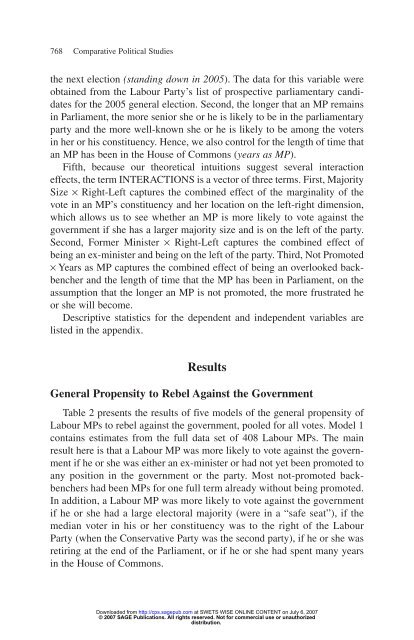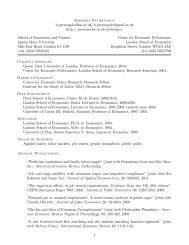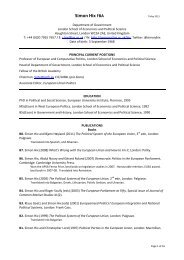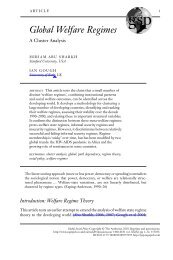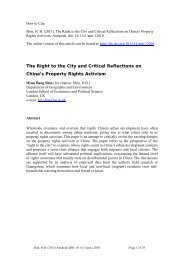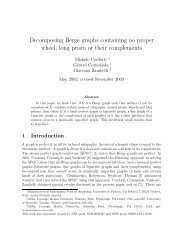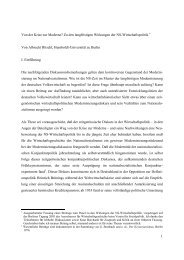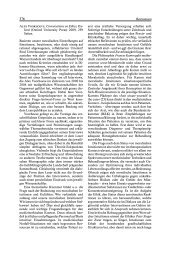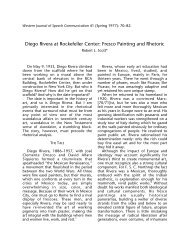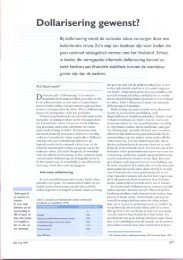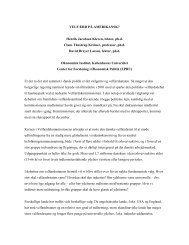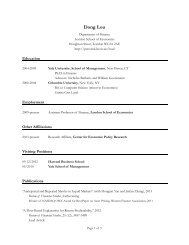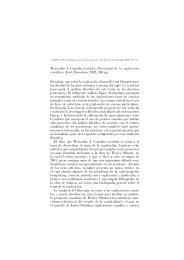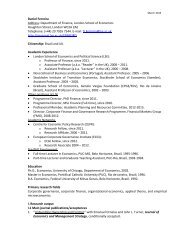The Rejected, the Ejected, and the Dejected: Explaining ...
The Rejected, the Ejected, and the Dejected: Explaining ...
The Rejected, the Ejected, and the Dejected: Explaining ...
You also want an ePaper? Increase the reach of your titles
YUMPU automatically turns print PDFs into web optimized ePapers that Google loves.
768 Comparative Political Studies<br />
<strong>the</strong> next election (st<strong>and</strong>ing down in 2005). <strong>The</strong> data for this variable were<br />
obtained from <strong>the</strong> Labour Party’s list of prospective parliamentary c<strong>and</strong>idates<br />
for <strong>the</strong> 2005 general election. Second, <strong>the</strong> longer that an MP remains<br />
in Parliament, <strong>the</strong> more senior she or he is likely to be in <strong>the</strong> parliamentary<br />
party <strong>and</strong> <strong>the</strong> more well-known she or he is likely to be among <strong>the</strong> voters<br />
in her or his constituency. Hence, we also control for <strong>the</strong> length of time that<br />
an MP has been in <strong>the</strong> House of Commons (years as MP).<br />
Fifth, because our <strong>the</strong>oretical intuitions suggest several interaction<br />
effects, <strong>the</strong> term INTERACTIONS is a vector of three terms. First, Majority<br />
Size × Right-Left captures <strong>the</strong> combined effect of <strong>the</strong> marginality of <strong>the</strong><br />
vote in an MP’s constituency <strong>and</strong> her location on <strong>the</strong> left-right dimension,<br />
which allows us to see whe<strong>the</strong>r an MP is more likely to vote against <strong>the</strong><br />
government if she has a larger majority size <strong>and</strong> is on <strong>the</strong> left of <strong>the</strong> party.<br />
Second, Former Minister × Right-Left captures <strong>the</strong> combined effect of<br />
being an ex-minister <strong>and</strong> being on <strong>the</strong> left of <strong>the</strong> party. Third, Not Promoted<br />
× Years as MP captures <strong>the</strong> combined effect of being an overlooked backbencher<br />
<strong>and</strong> <strong>the</strong> length of time that <strong>the</strong> MP has been in Parliament, on <strong>the</strong><br />
assumption that <strong>the</strong> longer an MP is not promoted, <strong>the</strong> more frustrated he<br />
or she will become.<br />
Descriptive statistics for <strong>the</strong> dependent <strong>and</strong> independent variables are<br />
listed in <strong>the</strong> appendix.<br />
Results<br />
General Propensity to Rebel Against <strong>the</strong> Government<br />
Table 2 presents <strong>the</strong> results of five models of <strong>the</strong> general propensity of<br />
Labour MPs to rebel against <strong>the</strong> government, pooled for all votes. Model 1<br />
contains estimates from <strong>the</strong> full data set of 408 Labour MPs. <strong>The</strong> main<br />
result here is that a Labour MP was more likely to vote against <strong>the</strong> government<br />
if he or she was ei<strong>the</strong>r an ex-minister or had not yet been promoted to<br />
any position in <strong>the</strong> government or <strong>the</strong> party. Most not-promoted backbenchers<br />
had been MPs for one full term already without being promoted.<br />
In addition, a Labour MP was more likely to vote against <strong>the</strong> government<br />
if he or she had a large electoral majority (were in a “safe seat”), if <strong>the</strong><br />
median voter in his or her constituency was to <strong>the</strong> right of <strong>the</strong> Labour<br />
Party (when <strong>the</strong> Conservative Party was <strong>the</strong> second party), if he or she was<br />
retiring at <strong>the</strong> end of <strong>the</strong> Parliament, or if he or she had spent many years<br />
in <strong>the</strong> House of Commons.<br />
Downloaded from<br />
http://cps.sagepub.com at SWETS WISE ONLINE CONTENT on July 6, 2007<br />
© 2007 SAGE Publications. All rights reserved. Not for commercial use or unauthorized<br />
distribution.


